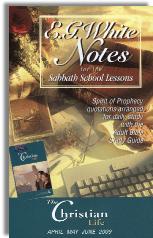|
||||||||||||||
Commentary on "Love"
Day 1: Sabbath Afternoon, March 28, 2009
Saturday’s lesson gives Isaiah 53, Matthew 22:37-39, 1 Corinthians 13, and 1 John 3 and 4 as the background texts for this week’s lesson on Love. The memory text is, “And now these three remain: faith, hope and love. But the greatest of these is love” (1 Cor. 13:13, NIV).
The lesson introduces the idea from 1 Corinthians 13 that without love, we are nothing. In continues by quoting Sophocles who said, “One word frees us of all the weight and pain of life. That word is love.” It concludes by saying that this statement does capture the “depth of love that was to be proclaimed and modeled by our Savior,” and it enlarges on this idea by saying everything God does is a manifestation of His love which is both comforting and difficult to comprehend.
God’s love, the lesson states, “far exceeds what human beings usually label as love, which is sometimes a mere shallow feeling or temporary infatuation that’s often mixed with selfishness and greed. God does not just have love or show love. He is love.”
Problems
The introduction to this week’s lesson is notable for what it does not say. The “Week At A Glance” at the bottom of the first lesson summarizes thus: “God’s love for humanity has been revealed in numerous ways, the greatest being the Cross. As followers of Jesus, we respond to His love by loving others as Christ loves us.”
The emphasis here is on our loving others as Christ loved us. The method for reaching this goal, however, is never explained. The emphasis here seems to be that God demonstrated love in many ways, and we, by following His example, are to emulate Him.
The Bible is quite specific about how we come to love as God loves. It is not through emulation. First, God’s love is demonstrated through the cross, but the cross is more than a revelation of God’s love. God didn’t merely show us how far He would go to reach us and thus allow Jesus to be crucified by wicked men.
On the contrary, the issue worked out on the cross was the payment of the blood-penalty God demanded for our sin. Romans 5:7-9 (ESV) says this:
“For one will scarcely die for a righteous person--though perhaps for a good person one would dare even to die—but God shows his love for us in that while we were still sinners, Christ died for us. Since, therefore, we have now been justified by his blood, much more shall we be saved by him from the wrath of God.”
The cross was not a demonstration; the cross was a payment; God publicly displayed Jesus “as a propitiation by His blood, to be received by faith” (Romans 3:25). This propitiation was to show God’s righteousness because He has “passed over former sins”, and by Jesus’ death, He demonstrated that He was both “just and justifier of the one who has faith in Jesus” (Romans 3:25-26).
Moreover, we do not demonstrate love by following His example or by “responding to His love”. In any case, how does one “respond to His love”? The lesson never makes that notion clear.
Romans 4 and 5 explain in detail how we are justified when we have faith in Jesus’ death. It is when we believe in Him who justifies the ungodly that our faith is credited as righteousness (Romans 4:5). When we have been justified by believing God and trusting Jesus’ blood to cover our sin, we then have “peace with God” (Romans 5:1). Now, having been justified and having peace with God, we finally experience God’s love—not merely toward us, but literally in our hearts. We get the love of God in our hearts this way:
Romans 5:5, ESV: “and hope does not put us to shame, because God's love has been poured into our hearts through the Holy Spirit who has been given to us.”
We do not love others by “responding to” or by emulating Christ. Rather, we become able to love others when, having believed Him who justifies the ungodly and thus receiving peace with God, He literally pours out His love into our hearts through the Holy Spirit whom He gives us.
Only as we are born again—born of the spirit (see John 3:3-6), can we love others. Our human emotion is a shadow of real love. We cannot love as Jesus loves or even begin to care for others without imposing our own subtle demands on them unless we have placed our faith in the Lord Jesus, accepted His blood-payment for our sin, and been sealed with the Holy Spirit (Ephesians 1:13-14) who fills us, literally, with God’s own love.
Summary
- The cross is not merely a revelation or demonstration of God’s love. It is the place where Jesus paid the blood-payment that God’s own law demanded for sin.
- We cannot merely respond to God’s love by loving others. We are incapable of emulating God’s love. Rather, we must be born of the Spirit—born again—and then God pours His love into our hearts through the Holy Spirit who is given to us. True love for others is not a mere “response” or emulation; it is literally a divine miracle that occurs in us as the Holy Spirit gives us new hearts of flesh in exchange for our natural hearts of stone.
Copyright 2008 BibleStudiesForAdventists.com. All rights reserved. Revised March 28, 2009. This website is published by Life Assurance Ministries, Glendale, Arizona, USA, the publisher of Proclamation! Magazine. Contact email: BibleStudiesForAdventists@gmail.com.
The Sabbath School Bible Study Guide and the corresponding E.G. White Notes are published by Pacific Press Publishing Association, which is owned and operated by the Seventh-day Adventist church. The current quarter's editions are pictured above.
Official Adventist Resources
Standard Edition Study Guide Week 1
Teacher's Edition Study Guide Week 1
Easy Reading Edition Study Guide Week 1
Search the Complete Published Ellen G. White Writings


